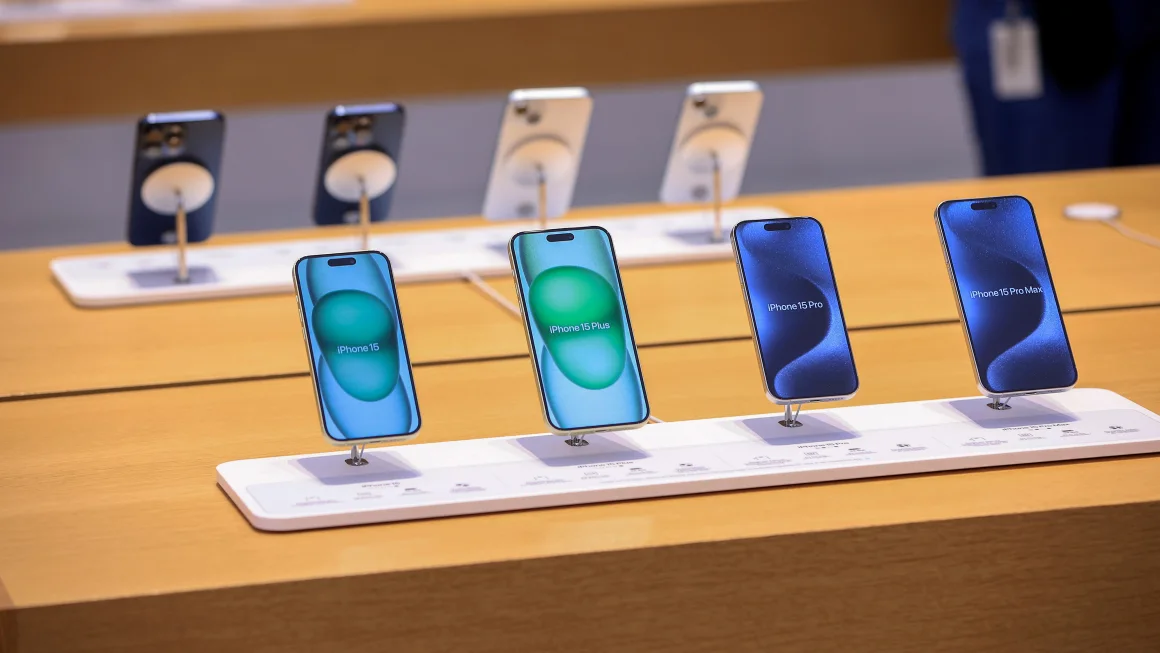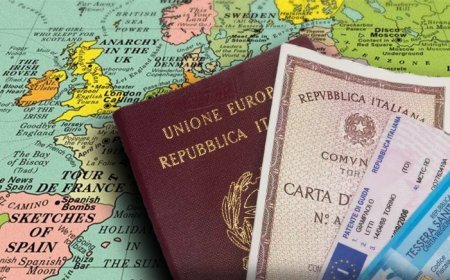Big changes for Apple, Google and other tech giants: Europe’s sweeping law goes into effect today

Europeans using Apple, Google and other major tech platforms woke to a new reality Thursday as a landmark law imposed tough new competition rules on the companies — changing European Union citizens’ experience with phones, apps, browsers and more.
The new EU regulations force sweeping changes on some of the world’s most widely used tech products, including Apple’s app store, Google search and messaging platforms, including Meta’s WhatsApp. And they mark a turning point in a global effort by regulators to bring tech giants to heel after years of allegations that the companies harmed competition and left consumers worse off.
The broad obligations apply only to the EU, which could leave tech users in the United States and other markets looking longingly at some of the features Big Tech is rolling out in response to the European directive.
In one seismic shift to comply with the law, Apple said it plans to let EU users download iPhone apps via third-party app stores — easing its grip on iOS for the first time since the App Store’s debut 15 years ago.
In another significant change, Google said it will alter search results to drive more traffic to independent comparison-shopping or travel-booking sites, instead of directing users toward Google Flights or other tools it owns. Google will also allow Android users to select a preferred browser and search engine from a menu of options when first setting up their devices, rather than defaulting users to Google’s Chrome browser and search engine. That could give a leg up to rival browsers such as Opera or Mozilla’s Firefox and competing search engines including DuckDuckGo or Microsoft’s Bing.
Users of messaging apps such as Signal or Viber, meanwhile, could soon be able to send chat messages directly to people who use Meta’s Messenger and WhatsApp platforms, under a new openness requirement imposed on the social media giant.
And streaming services such as Spotify and Netflix could potentially market discounts within their apps to those that buy subscriptions through the services’ respective websites rather than through proprietary in-app payment systems once forced on app developers by the app stores.
The EU’s edict
The industry-wide changes are linked to the Digital Markets Act (DMA), a 2022 law requiring dominant online platforms to give users more choices and rivals more opportunities to compete. Its broad obligations affect six of the world’s largest tech companies: Amazon, Apple, Google, Meta, Microsoft and ByteDance, the parent company of TikTok.
By mid-May, that list could also include Elon Musk’s X and Booking.com, the European Commission said this week.
Violations of the DMA can lead to stiff penalties, including fines of up to 10 percent of a company’s global revenue and up to 20 percent for repeat offenses. For most of the regulated companies, that would translate to tens of billions of dollars.
For years, policymakers around the world have accused tech giants of monopolizing digital markets and using consumers’ personal data to entrench their power or to identify new markets to dominate. The tech giants, for their part, have insisted they compete vigorously, have created valuable opportunities for entrepreneurs and unlocked billions of dollars in economic activity.
Europe’s broad new rules highlight skepticism of that defense and showcase how the EU has led the charge on tech regulation globally, sometimes with ripple effects for the rest of the world.
The trading bloc has approved other comprehensive legislation in recent years regulating digital privacy, social media and, soon, artificial intelligence. Some of its regulations have had broader impacts: In 2022, a new EU law forcing Apple to use USB-C as the charging standard for mobile devices prompted Apple to adopt the standard for all its new iPhones, including in the United States.
Targeting certain gatekeepers
Europe’s new competition law does not directly target the six named companies. Rather, it says that companies meeting a specific size threshold must abide by certain “gatekeeper” rules to prevent them from abusing their enormous economic power.
One way the EU plans to regulate that power is by giving consumers more control over how tech giants use their personal information. Under the DMA, EU citizens will be able to opt out of having their usage history from one app shared with other apps owned by the same company. For example, Google users will be able to prevent their search and browsing histories from being shared with Google’s YouTube video platform, which could affect what videos YouTube suggests to users. Amazon, meanwhile, will need consumers’ consent before using their Prime Video, Kindle or Audible usage history to create targeted recommendations or advertisements on its e-commerce marketplace.
Europe’s first-of-its-kind digital competition law draws contrasts to the United States, where proposals to regulate the tech industry have repeatedly floundered. Some of the ideas in the DMA have been replicated in US legislation but have failed to pass amid industry opposition and ordinary congressional gridlock.
While the law could increase demand for tech companies to extend EU-specific features to other markets, few platforms have shown signs they plan to do so. For example, Apple’s app store plans for Europe diverge significantly from changes to its US-based app store that it was forced to make as part of an antitrust lawsuit involving “Fortnite”-maker Epic Games. Apple has not given any indication it will harmonize the two sets of policies.
Consumer groups say the DMA promises to lower prices for Europeans by forcing platforms open and requiring them to compete on a more level playing field.
“We have worked really hard at the EU level to get this law adopted to improve digital markets in benefit of consumers,” said Agustin Reyna, legal director at BEUC, a coalition of EU-based consumer advocacy organizations.
Tech pushes back
But some tech companies have pushed back on the DMA, warning that it could lead to unintended consequences.
Google, for example, argued this week that its changes to search results in response to the DMA could drive more searches to aggregators of travel or restaurant listings rather than to individual hotels, airlines, restaurants and retailers. It also warned that because of the new requirements around data-sharing, many of Google’s recommendation features “won’t work in the same way anymore,” suggesting life could become less convenient for users who revoke their consent.
Meanwhile, Apple has said that requirements to support third-party app stores could expose iOS users to greater amounts of spammy or malicious software, due to Apple’s weakened control over app developers.
“The new options we’re introducing to comply with the DMA necessarily mean we will not be able to protect users in the same way,” Apple wrote in a white paper it published last week ahead of Thursday’s compliance deadline. “The changes the DMA requires will inevitably cause a gap” between EU users’ security and the security Apple users enjoy outside the EU, it added.
That may have a kernel of truth, but proponents of the DMA have said it can be difficult to determine where legitimate objections to the law end and where self-interest begins.
As companies begin to comply with the letter of the DMA, expect some to try to evade its spirit by using consumer scare tactics or “dark patterns,” subtle interface designs intended to nudge users toward sharing more of their data or making other choices a company prefers, Reyna said.
“These include misleading language such as ‘use for free’ when consumers pay [for a service] with their data,” BEUC wrote in a report last week. “Data protection options are buried in a maze of settings, and the use of contrast and colours for the ‘accept’ and ‘refuse’ buttons can steer users to the response the gatekeeper wants.”
Some companies are already accusing tech giants of flouting the law.
On Wednesday, Epic Games published emails showing Apple blocked its request this month to launch a third-party app store on iOS in Europe. In a complaint to EU officials, Epic said Apple justified the decision by referencing Epic’s past deliberate violation of Apple’s app store terms and Epic’s public criticism of Apple.
If Apple’s decision is allowed to stand, it will mean tech giants can thwart competition and undermine the law just by pointing to a rival’s past efforts to call out anticompetitive behavior, said Tim Sweeney, Epic Games’ CEO.
Past US court rulings have upheld Apple’s right to cut ties with Epic for any reason, Apple said in a statement. “In light of Epic’s past and ongoing behavior, Apple chose to exercise that right.”
The European Commission has asked Apple to explain its actions under the DMA, a Commission spokesperson told CNN Thursday. The EU’s executive body is also evaluating whether Apple’s actions “raise doubts on their compliance” with other EU rules, the spokesperson added.
Compliance deadline day
Thursday’s deadline is the final opportunity for gatekeeper companies to submit detailed plans to the European Commission showing how they will comply with the DMA.
After reviewing the plans, which could take weeks or months, the commission may choose to launch investigations into companies suspected of noncompliance. Those probes could last for up to one year. Even after the plans are reviewed, the commission could still launch compliance investigations at any time, particularly if it receives complaints from the public.
The Computer and Communications Industry Association (CCIA), a trade group representing four of the six gatekeeper companies — Amazon, Apple, Google and Meta — told CNN that “regulators need to resist the urge to politicize the process” of reviewing the plans.
DMA enforcement “should be proportionate and unbiased, taking into account the significant differences between gatekeepers, as well as how these services work in reality,” said Daniel Friedlaender, senior vice president of CCIA and head of its Europe office.
Friedlaender warned that the DMA could also frustrate consumers by leading to “product updates they don’t want” or that they could see “changes to their favorite services they really don’t like.”
Olesya Dmitracova contributed reporting.
The post Big changes for Apple, Google and other tech giants: Europe’s sweeping law goes into effect today appeared first on Egypt Independent.
What's Your Reaction?
 Like
0
Like
0
 Dislike
0
Dislike
0
 Love
0
Love
0
 Funny
0
Funny
0
 Angry
0
Angry
0
 Sad
0
Sad
0
 Wow
0
Wow
0



















































